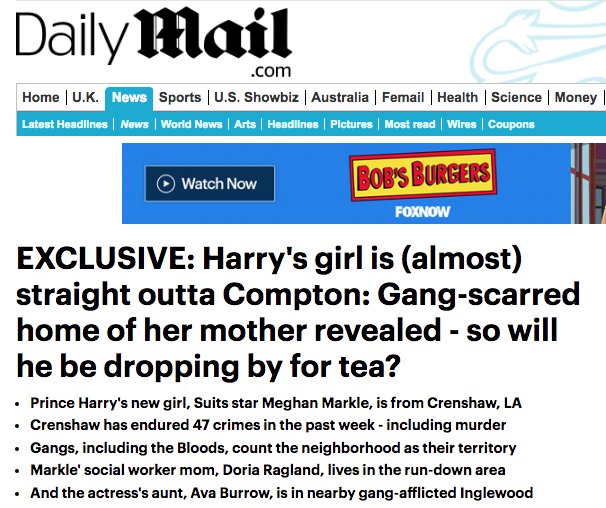There is no end to situations where ethnic minorities in the UK will have to address racist behaviour. Be it at work, school, in the community, we can’t run from racism in the UK: it’s alive and well.
However, the recent debate around racism in the media, specifically toward Meghan Markle, has negatively impacted not only the discussion around it but even the questioning the fact of its existence.
A disaster from the beginning
Over the last two weeks, breakfast shows have staged as battlegrounds for fierce debate around whether Britain’s racist media forced Harry and Meghan to step down as full time royals. We’ve seen several leading black and Asian politics/race commentators flock to shows such as Good Morning Britain and This Morning to trade blows with hosts as they explained why they believe Meghan Markle’s negative press was racially fuelled.
Among these commentators was bestselling author, Afua Hirsch, and activist and lecturer, Dr Shola Mos-Shogbamimu. Now the issue for our black and Asian guest panellists is that the format of breakfast shows like GMB are not built to effectively answer questions like, “Was Meghan’s media coverage racist?”
Attempting to unpack issues as deep-rooted and complex as racism in the UK during a five-to-ten minute slot whilst Piers Morgan shouts you down does a serious disservice to a very important and extensive discussion. How do we have an honest discourse whilst Morgan shouts over, gas lights and shuts down guests before the convenient “that’s all we’ve got time for.” A few interjections of “let him/her finish,” from Susanna Reid do very little after Morgan has brutally dismissed guest panellists.
As a result, you end up with a less than half-baked discussion, a pleased Piers Morgan and a very frustrated guest panellist. And that’s not to say hosts such as Piers Morgan and others shouldn’t have and share their own opinion with conviction. My point is, will a ten-minute “debate” with a bullish, self-proclaimed royalist, who definitely has some gripe against Harry and Meghan, really breed any fruitful and progressive discussions on race in the media? No, it, in fact, does the opposite.
Possible racism cannot be overlooked
Whether Meghan Markle’s media coverage in the last 18-months has been completely racist is a whole article in itself, but we can’t ignore that the press has inappropriately racialised her at points.
An example is Mail Online’s headline linking Meghan to “gang scarred Compton,” where they reported 47 crimes were committed there in a week. What exactly does this have to do with Meghan who at the time based was in Toronto? If Meghan was white, would she have been associated with Compton’s gang violence? Of all the things that happen in Los Angeles, why is that specifically mentioned in Meghan’s case? Another example would be leading BBC radio host, Danny Baker, comparing Harry and Meghan’s baby to a chimp. Outright cruel and disrespectful from an influential figure in British media.

Granted, some would argue people dislike Harry and Meghan’s proposed hypocritical virtue signalling, but racially charged media coverage should never for a moment be swept under the carpet as a non-issue.
An example of this was seen on last week’s Question Time featuring actor Laurence Fox. In response to an audience member who called Meghan’s media coverage racist, Fox quickly dismissed her point saying, “Britain is the most tolerant and lovely country in the world.”
This response was met with applause which is where the pinnacle of my concern lies. To many viewers of these discussions, high profile celebrities like Piers Morgan and Laurence Fox dismissing accusations of media racism against Meghan Markle, creates an illusion that Britain has no issues with race. One look at a few tweets in response to Stormzy saying there’s racism in Britain will show you this couldn’t be farther from the truth.
The issue with breakfast shows is that for the most part, the best sound bite wins the discussion. And in the case of Piers Morgan, for example, he is the king of quick quips that herald his experience of race as true and completely invalidate the experiences of black and Asian people as illogical.
We need better platforms for discussion
But the key issue here is that people believing this illusion will feel dangerously less inclined to even consider racism in the country and potentially their own lives.
Racism in the UK, at an institutional level especially, is not easy to explain, so making this attempt in seven minutes whilst being shouted at is a sure recipe for disaster. Time shouldn’t be given to morning shows where the aim isn’t genuinely seeking to understand someone you don’t agree with.
What we desperately need for these conversations around race are platforms where civil discourse can take place openly, honestly and extensively. A platform where participants who disagree genuinely want to understand the perspective of the other is the first requirement. And a platform where there is adequate time given for peers to flesh serious issues. Pitting two opposing sides against each other when the whole point is for neither to listen or give up in any ground only promotes the idea that this is how these issues are to be discussed.
With topics as complex as racism in the media, there may not be a final agreement on all points, but a move toward understanding will help will resolve deep-rooted issues.


